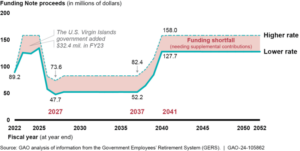
In February 2022, Gov. Albert Bryan signed a bill permitting the government to refinance the territory’s rum cover-over matching fund bonds and use the interest rate savings to stabilize the Government Employees’ Retirement System.
Residents and government officials breathed a sigh of relief. The system, which affects the income of over 8,000 people now and thousands more in the future, had been predicted to go bankrupt by 2025.
The federal Government Accountability Office report issued last week doesn’t sigh so confidently. Its title, “Retirement Security: The U.S. Virgin Islands’ Pension Plan Faces Risks Paying Government Employee Benefits.” The report compares GERS to the other publicly defined benefit pensions, illustrates the risks GERS faces in paying promised pension benefits, and provides options for the local government and GERS to ensure that GERS provides the promised pension benefits.
According to the GAO report, “The U.S. Virgin Islands’ Government Employees’ Retirement System remains one of the lowest funded public pension plans in the U.S. While most public plans in our review had enough funding to cover 60 to 111 percent of plan liabilities as of 2021, USVI’s plan had enough to cover about 10 percent.”
Delegate to Congress Stacey Plaskett in 2020 requested a study by the federal agency. Last week, she and the GERS administrator sent press releases concerning the report.
Territory officials have stated that the rescue plan assures stability for 30 years. The GOA indicates that stability is only ensured for 10 years.
A critical factor is the amount of rum taxes returned to the territory. Against Plaskett’s recommendation, calculations were based on a higher return of rum taxes than mandated by law.
Angel Dawson, the GERS administrator, stated it this way in his press release, “while the GERS’ financial position has substantially improved due to receipt of a Funding Note in April 2022 that provides dedicated funding to the GERS with revenue from the cover-over of excise taxes on rum sales on the U.S. mainland, we are not ‘out of the woods’ as yet. This is due to how the Funding Note issued by the V.I.Public Finance Authority is structured and to recent unpredictability in the timing of Congress’ passing tax extenders to increase the rum cover-over rate from $10.50 to $13.25. Perhaps the GAO’s release of this report to Congress will convey the urgency of the cover-over rate being permanently increased to $13.25.”
The delegate’s press release stated that the ongoing risk of insolvency for GERS is a shared responsibility of the USVI executive and legislative branches.
The report further found that “GERS has made changes to its plan since 2005—similar to eight other selected public plans, including in the four U.S. territories. These changes applied to all new hires and included decreasing benefits, increasing the retirement age, and increasing employee contributions.”
It added, “The USVI government secured additional funding for the plan through an excise tax on rum in April 2022. However, GERS continues to face the risk of insolvency. According to GAO’s analysis, GERS may face insolvency within the next ten years if the excise tax rate is lower than expected or if rum sales decline, among other risks. For example, the GERS’ revenue projections for the excise tax used a $13.25 per proof gallon tax rate that expired in 2021 and reverted to a lower statutorily defined rate in 2022 ($10.50). While the USVI government has paid the resulting shortfall in 2023, it is not required and may not be sustainable.”
These concerns are not new. Members of the GERS Board of Trustees have raised questions at meetings about the shortfall and whether the government could continue to bridge it with general fund money.
The press release from Plaskett’s office said, “In 2020, Congresswoman Plaskett, in conjunction with Congressman Grijalva, then Chairman of the House Natural Resources Committee, requested that GAO conduct this report, considering the crucial role that the GERS pension system plays in the lives of the people of the U.S. Virgin Islands.”
Delegate Plaskett added. “I am pleased that this report, requested in 2020, is complete following delays due to the COVID-19 pandemic; it is my hope that this will provide a roadmap to a path forward for the GERS pension system and enable the development of a sustainable solution.”
The report recommended, “The USVI government could consider several options to better ensure such benefits. For example, some governments have dedicated additional specific revenue streams, such as a portion of sales taxes, to their plans.”
It said the report was undertaken because the plan affected “19,000 participants and was historically underfunded by the Territory government.”
The GAO is an independent, non-partisan agency that works for Congress.
Click here to access the GAO report.


